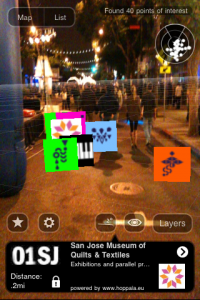Pedagogy & Digital
Finally, this is the reason that I’m going to THATCamp — to learn how to incorporate more digital into my undergraduate classes. Most of my courses have this kind of component, but I’m wondering if we can also discuss how to create a project-centered course that focuses students on producing something. In literary studies, we don’t do this very often. Do you have a model? How about those in libraries or industry? How does project-centered work begin, where does it fail, where does it succeed? I think we can take advantage of the Silicon Valley imperative for working together and translate that skill to the classroom.
Filed under Sessions | Comments (3)Mark-Up Languages – Standards?
There has been lots of talk over Humanist-L and in backchannels about the standardized mark-up language. TEI is the one I’ve seen most used, and I can read most TEI. It’s also becoming automated with some recently distributed program materials (or pseudo-automated). However, my university library doesn’t use TEI. For this session, perhaps we can discuss mark-up languages for big digital projects (scholarly editions are my area) and how to facilitate working with the university library to create, maintain and sustain using these mark-up languages. What other platforms are out there? Is there something else out-of-the-box?
Filed under Sessions | Comments Off on Mark-Up Languages – Standards?Bootcamp Session: Omeka?
I have an interest in creating exhibits or collections with Omeka both for my project and in the classroom, so possibly this bootcamp session might have a dual focus or perhaps there’s another way to insert pedagogy into another bootcamp session?
- Using Omeka to build digital scholarly editions.
- Using Omeka in the undergraduate classroom — how to integrate into the curriculum with learning goals, assignments, etc.
- Introducing Omeka to the library staff — how to best explain this in terms that the library will value.
mobile augmented reality for poets & other non-programmers
Here’s my proposal for a hands-on bootcamp workshop: I’d like to teach interested folks how to create their own mobile augmented reality experiences quickly, easily and with no programming skills required.
Mobile augmented reality (AR) turns your mobile phone into a magic lens that reveals hidden stories about the world. In this workshop you will learn the basics of building mobile AR experiences for the iPhone & Android phones, using easy web-based tools that do not require any programming experience. The specific tools I’ll teach are the Layar mobile AR platform and the companion Hoppala authoring tool. The two requirements you’ll need are a laptop with web access, and an iPhone 3Gs (or later) or a 3G Android phone with internal GPS and compass (most of them).
Sound like fun? Here’s an example screenshot from a layer we did for the 01SJ Biennial last month:
 Filed under BootCamp
| Tags: AR, bootcamp |
Comments (4)
Filed under BootCamp
| Tags: AR, bootcamp |
Comments (4)
Under-served and overwhelmed or underwhelmed and over-served?
Title in need of work but for session suggestions I have two areas of interest:
I want to learn more about the possibilities of reaching under-served audiences and making new platforms more accessible for older users. Feeling in need of conversation and brainstorming about – what, how, why, when, who for? etc. Very interested in the language museums and galleries use to communicate with their publics and their own perceptions and measurements for their level of success. Are the available evaluation tools any use? What is really being communicated? What do audiences really need?
Also, during the course of research for my thesis on multi-lingual interpretation I learnt that in 2008 only 9% of museum audiences in the US were from minorities and yet by 2034, the US will be a majority of minorities. According to a report by the Pew Internet and American Life Project in 2010, African Americans and English-speaking Latinos use cell phones at a much higher rate to access the web than whites (wow I hate all these classifications). Is any of this useful information and if it is why is it? Or, are these statistics irrelevant and detrimental?
Filed under Sessions | Comments (2)